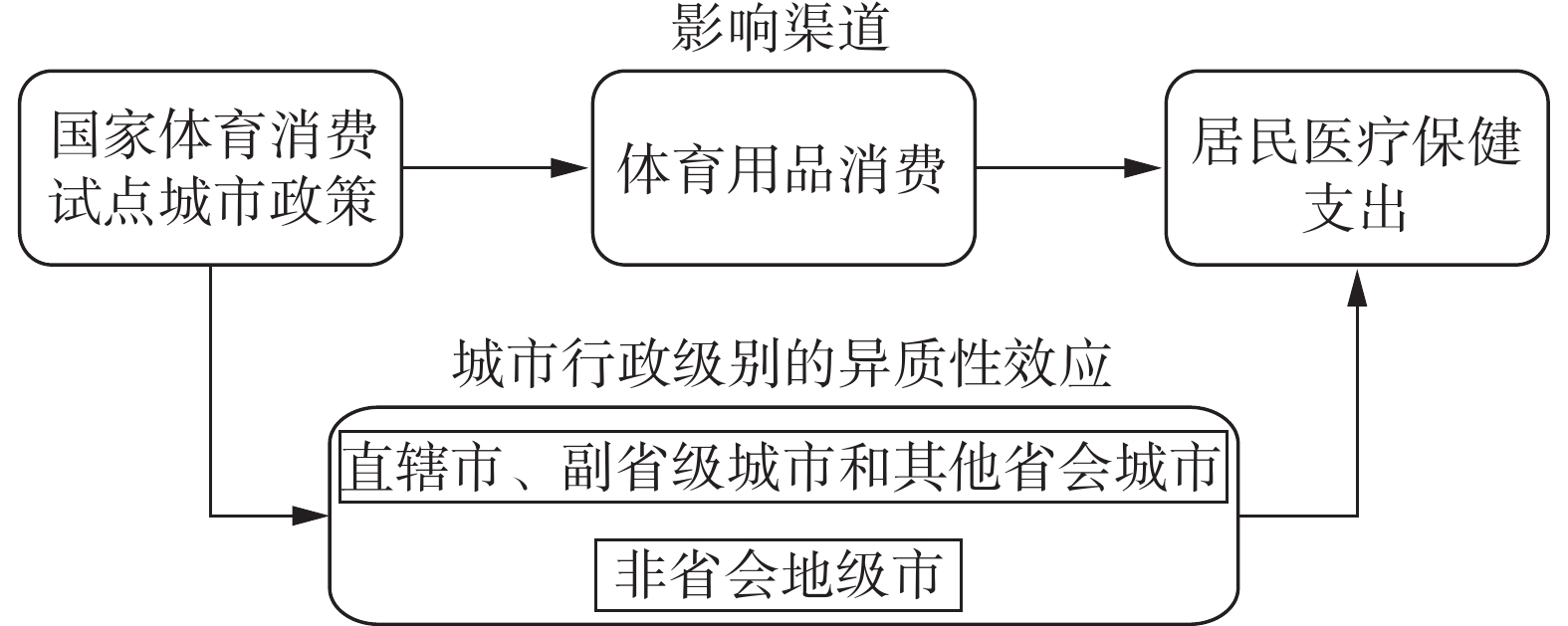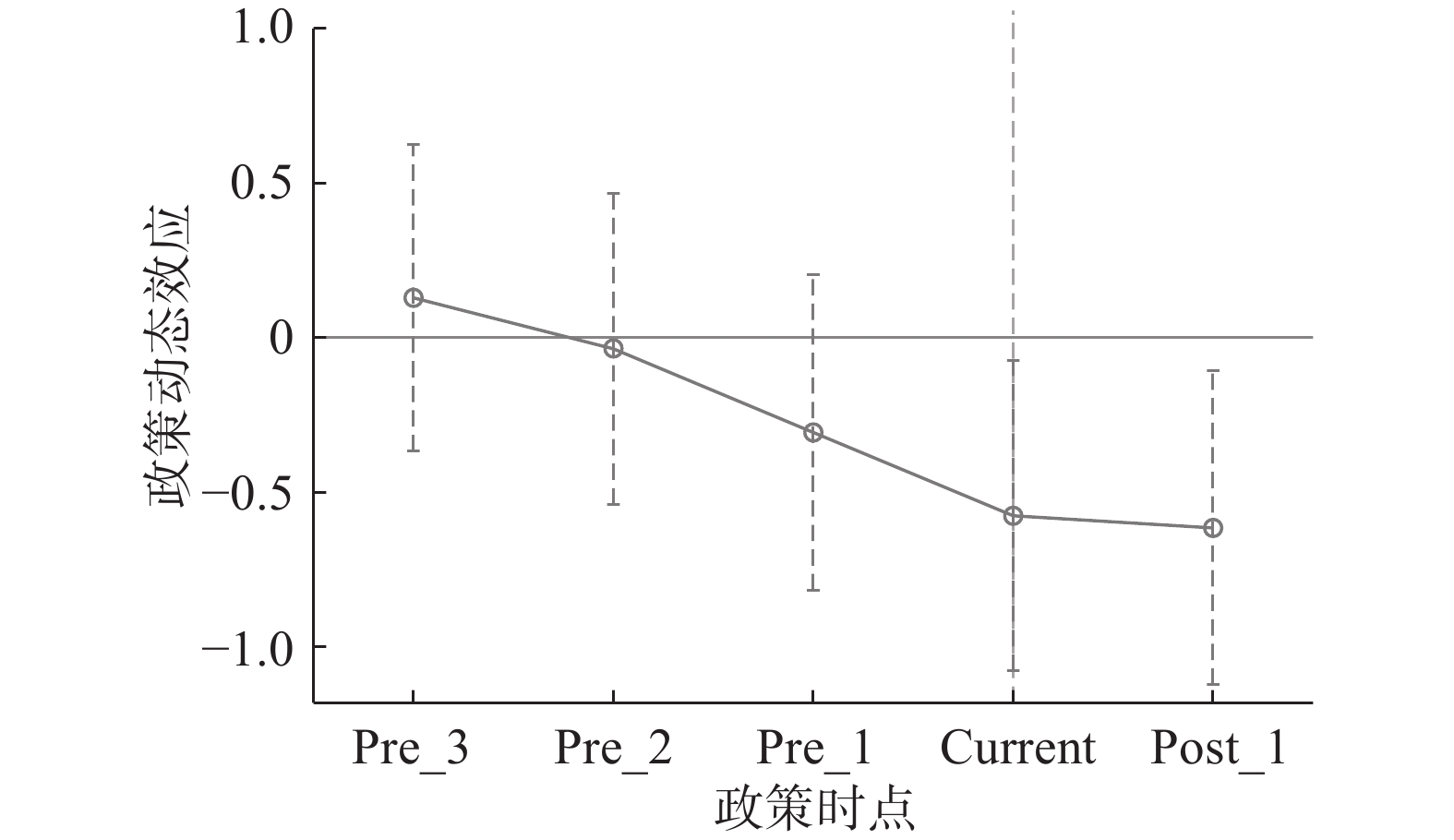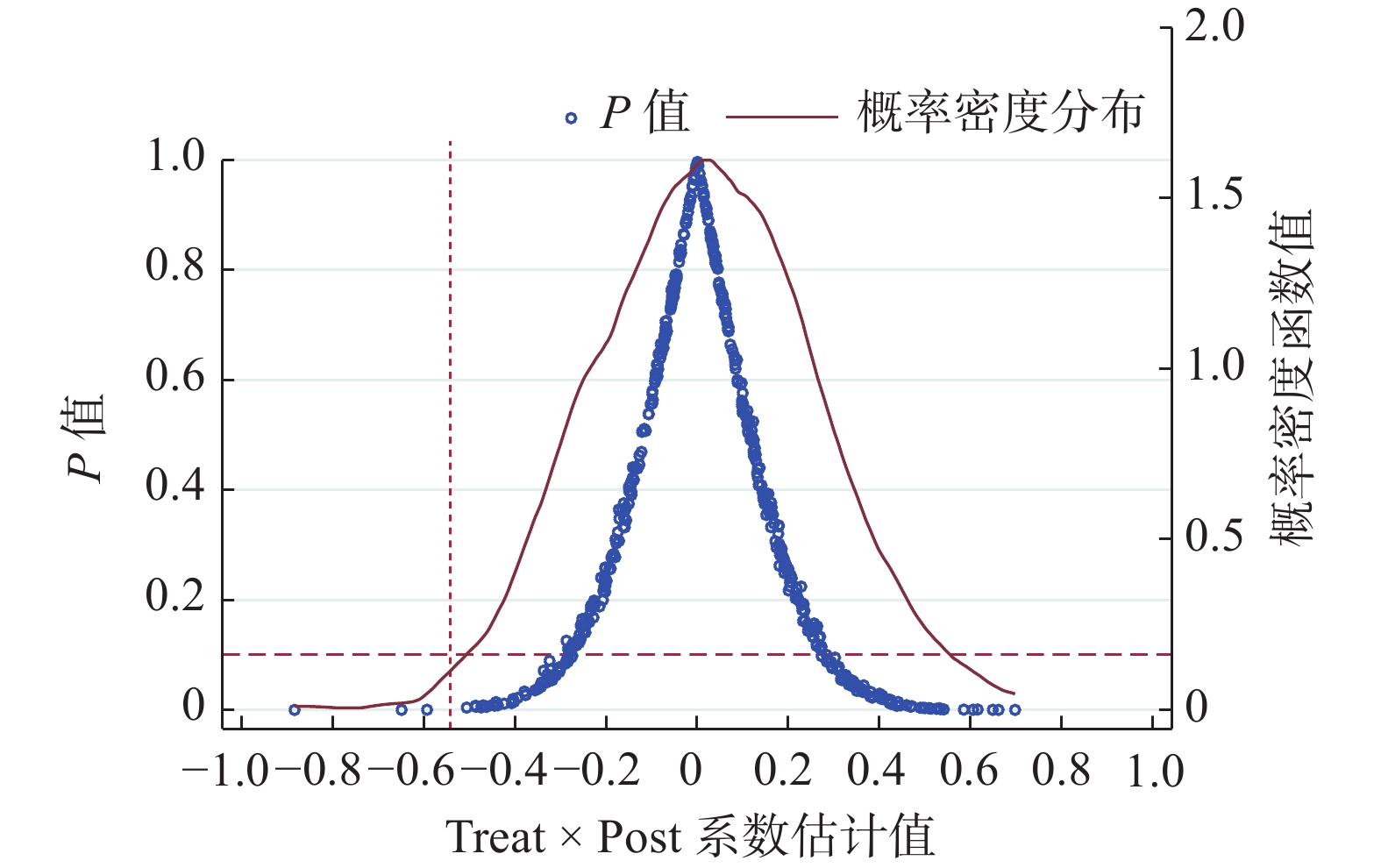Impact of the Policy on National Sport Consumption Pilot Cities on Residents' Health ExpendituresAn Empirical Analysis Based on the Difference-in-Differences Model
-
摘要:
基于国家体育消费试点城市政策这一准自然实验,运用双重差分模型分析其对居民医疗保健支出的影响。结果表明:①国家体育消费试点城市政策显著降低了试点城市的居民医疗保健支出,相较于非试点城市,试点城市的居民医疗保健支出平均下降约0.542%;②增加居民体育用品消费是国家体育消费试点城市政策降低居民医疗保健支出的重要途径;③国家体育消费试点城市政策对居民医疗保健支出的影响在不同类型城市之间存在异质性,该政策的影响效应在非省会地级市更为显著。因此,拓展体育消费试点城市政策的覆盖范围、制定差异化的地区体育消费政策以及提高居民体育消费水平是降低居民医疗保健支出、实现医疗保健体系可持续发展的关键举措。
-
关键词:
- 国家体育消费试点城市政策 /
- 居民体育用品消费 /
- 居民医疗保健支出 /
- 双重差分模型
Abstract:Based on the National Sport Consumption Pilot City Policy as a quasi-natural experiment, a difference-in-differences model is employed to study the impact of the policy on residents' health expenditures. The research results indicate that:the National Sport Consumption Pilot City Policy significantly reduces health expenditures in the pilot cities, with an average decrease of approximately 0.542% compared to non-pilot cities; increasing residents' sports products consumption is a crucial pathway for the policy to reduce health expenditures; the impact of National Sport Consumption Pilot City Policy on residents' health expenditures shows the heterogeneity among different types of cities, with the policy's effects being more pronounced in non-capital cities. Therefore, it is necessary to expand the range of the pilot cities, formulate different regional sports consumption policies, and enhance residents' sport consumption levels in order to reduce residents' health expenditures and achieve sustainable development of the healthcare system.
-
随着我国人口结构的变化,老龄化程度不断加深,居民的医疗保健支出持续增长,医疗保健系统承受了较大的压力。根据国家统计局公布的数据,2013—2022年我国城镇居民人均医疗保健支出年平均增速约为17%,显著快于我国城镇居民可支配收入增速(13%)和消费性支出增速(10%)。这使我国医疗保健体系面临重大挑战,也成为全社会关注的重要问题。
体育消费作为消费构成中改善居民健康状况的重要手段,能较好地满足大众非医疗健康等方面的需求,激发人们参与体育活动的兴趣,提高国民的健康水平,从而有助于降低医疗保健支出。据联合国研究报告估算,在体育运动中每花费1美元就可以在医疗成本中节省3.2美元[1]。然而,由于受生活习惯及传统观念等因素影响,我国居民对体育消费投入相对较少、对体育器材消费有限,这导致体育消费在整体消费结构中占比较低,存在体育消费不足的问题。为了促进体育消费回补和潜力释放,同时贯彻落实《国务院办公厅关于促进全民健身和体育消费推动体育产业高质量发展的意见》,国家体育总局制定了“国家体育消费试点城市政策”[2],并取得了较大的实施成果。根据2023年12月召开的国家体育消费试点城市总结交流会发布的数据,2022年40个国家体育消费试点城市的居民人均体育消费支出平均值为
2576 元,分别比2020年和2021年增长19.65%和7.11%[3]。体育消费政策对扩大体育消费具有重要的促进和引领作用,特别是体育消费政策的落实是我国体育消费水平快速提升的内在动力[4],有利于提振民众的体育消费信心,激发其消费活力。在国际上,学者们[5−7]的研究主要集中于体育消费的动机和影响因素,较少涉及体育消费政策。在国内,部分学者[4, 8−10]针对我国近年出台的《国务院关于加快发展体育产业促进体育消费的若干意见》(国发〔2014〕46号)以及国家体育消费试点城市政策等各类体育消费政策的落实情况展开了一系列研究。但总体而言,国内现有研究较多集中于对体育消费政策的文本分析[9−12],较少采用定量方法全面评估体育消费政策产生的经济效应[13−15],更鲜有学者针对体育消费政策是否能够对居民健康产生影响进行实证分析。同时,改善居民健康状况是政府部门制定体育消费政策、营造良好体育运动环境的重要目的之一,体育消费政策是否能有效减少居民医疗保健支出也是评价政策实施效果的重要标准。因此,研究体育消费政策对居民医疗保健支出的影响具有重要的理论与实践意义。
1. 国家体育消费试点城市政策背景介绍
2019年发布的《国务院办公厅关于促进全民健身和体育消费推动体育产业高质量发展的意见》[16]提出了“开展促进体育消费试点工作,确定一批国家体育消费试点城市”的政策目标。2020年5月,国家体育总局发布了《体育总局办公厅关于开展国家体育消费试点城市申报工作的通知》,指出“确定一批国家体育消费试点城市,形成若干促进体育消费的经验做法,推动我国体育消费规模持续增长、消费结构不断升级,为稳就业、稳增长、促消费、惠民生做出积极贡献”。首轮试点周期为3年(2020—2022年),满足“工作机制健全”“产业基础较好”“体育设施健全”“支持措施明确”等条件的城市均可提出申请,并由各省(区、市)体育局审核后向体育总局报送[17]。最终,国家体育总局于2020年8月公布了40个入选的国家体育消费试点城市[2]。
在具体实施层面,各试点城市主要依据国家体育总局发布的《促进体育消费试点工作实施方案》,围绕“建立强有力的试点工作推进机制”“完善促进体育消费政策措施”“创新体育产品和服务供给”“健全体育消费数据统计调查制度”等方面因地制宜地开展试点工作[17]。具体措施包括激发居民体育参与热情、培养终身运动习惯、营造城市体育消费氛围、促进体育产业升级与体育产品创新、举办大型体育消费主题活动等[12, 15]。例如,绍兴市在2020—2022年试点期间,面向全国发放了
6000 万元体育消费券,覆盖游泳、滑雪、卡丁车等17类项目,累计带动消费1.38亿元[18]。青岛市在新冠疫情期间推出的“你健身、我买单”全民健身消费券派送活动中发放各类消费券19万余张,市值超过2亿元,为健身经营单位引流客源超过4万人次[19]。这些政策有效地降低了居民购买体育用品的门槛,满足了居民对体育用品的多样化需求。为了提升居民参与体育运动的便利度,激发居民体育参与热情,部分城市还出台了具有地方特色的政策措施。例如,江西省新余市利用大数据、云计算、人工智能等先进技术打造体育消费“半小时经济圈”,建立城市智慧体育综合服务网络,为群众体育消费提供支撑。目前该系统注册用户突破10万人,日均活跃用户超过
7000 人,创造间接经济价值1031.57 万元[20]。苏州、青岛、秦皇岛等城市将体育产业与文化旅游产业相结合,在当地自然景观资源周边开发健身步道等公共运动场所,使居民在参与体育运动的同时能够充分放松身心,改善心理健康。日照市依托日照市体育医院,通过开具“运动干预处方”的方式构建全生命周期的健康管理体系,积极推动居民的健康观念从“疾病治疗”向“健康管理”转变,实现“体卫融合”[21]。在一系列政策措施的刺激下,国家体育消费试点城市的居民人均体育消费显著上升,根据国家体育总局发布的调查数据,2022年40个国家体育消费试点城市居民人均体育消费支出平均值为
2576 元,比2020年的平均值2153 元增长了19.65%[3]。同时,根据部分试点城市自主发布的《居民体育消费调查报告》,国家体育消费试点城市政策实施后大部分试点城市的人均体育消费支出明显提高,上海、深圳等城市的体育消费水平已接近人均500美元的欧美发达国家标准。为研究国家体育消费试点城市政策对居民医疗保健支出的影响,本文将40个国家体育消费试点城市作为政策处理组。国家体育消费试点城市的确立需要经过各省(区、市)的推荐申报以及国家体育总局的审核,国家体育消费试点城市基本属于各省(区、市)经济较为发达或具有特色体育产业的城市,而经济相对欠发达的城市获评国家体育消费试点城市的可能性较低,若以我国全部城市作为对照样本进行分析很可能产生“自选择偏误”(self-selection bias)问题,导致模型估计结果出现偏误[22]。国家统计局发布的“70个大中城市”名单基本覆盖了各省(区、市)经济排名中上的城市,具有较强的权威性和统计连贯性,更适合作为国家体育消费试点城市的对照组。因此,本文参考曹清峰[23]和毛丰付等[24]的研究,选取70个大中城市中未入选国家体育消费试点城市的42个城市作为对照组。在稳健性检验部分更换了多种样本城市的选取方式,对研究基本结论的稳健性进行了讨论。
全部样本共计82个城市(表1)。样本城市范围内试点城市的设定并未偏重于特大城市或经济最为发达的城市,而是考虑了试点城市与非试点城市的可比性。例如:在直辖市中,上海市与重庆市被设为试点城市,而北京市与天津市不属于试点城市。在副省级城市中,同属于广东省的深圳市为试点城市,而广州市为非试点城市;同样,来自山东省的青岛市为试点城市,而济南市为非试点城市。因此,国家体育消费试点城市的设立在大中城市范围内满足准自然实验的外生性要求。
表 1 试点城市与非试点城市对照Table 1. List of pilot cities and non-pilot cities试点城市(处理组) 非试点城市(对照组) 直辖市 上海市、重庆市 北京市、天津市 副省级城市 沈阳市、大连市、长春市、南京市、宁波市、厦门市、青岛市、深圳市、成都市、西安市 哈尔滨市、杭州市、济南市、武汉市、广州市 其他省会城市 合肥市、福州市、南昌市、长沙市、昆明市、兰州市、银川市、乌鲁木齐市 石家庄市、太原市、呼和浩特市、郑州市、南宁市、海口市、西宁市、贵阳市 非省会地级市(州) 秦皇岛市、张家口市、吉林市、常州市、苏州市、绍兴市、金华市、黄山市、三明市、新余市、日照市、洛阳市、宜昌市、荆门市、三亚市、遵义市、咸阳市、渭南市、白银市 唐山市、包头市、丹东市、锦州市、牡丹江市、无锡市、徐州市、扬州市、温州市、蚌埠市、安庆市、泉州市、九江市、赣州市、烟台市、济宁市、平顶山市、襄阳市、岳阳市、常德市、韶关市、湛江市、惠州市、桂林市、北海市、泸州市、南充市、大理白族自治州 数据来源:国家统计局、国家体育总局。 试点城市的划定与政策实施前各城市居民的医疗保健支出水平并无显著的关联。首先,对处理组和对照组城市在政策实施前(2016—2019年)的居民医疗保健支出进行描述性统计和组间均值差异检验(表2),结果表明,两组城市的居民医疗保健支出在政策实施前并无显著差异。其次,计算试点政策实施前(2016—2019年)各城市的居民医疗保健支出与成为试点城市之间的相关系数,结果表明二者之间的相关系数约为0.005。因此,没有证据表明被列为试点城市与该城市在政策实施前的居民医疗保健支出水平存在显著相关性,这表明国家体育消费试点城市政策在处理组和对照组之间满足随机分配[25−26]。
表 2 试点城市与非试点城市政策实施前居民医疗保健支出差异情况(2016—2019年)Table 2. Differences in health expenditures between pilot cities and non-pilot cities before policy implementation from 2016 to 2019指标 处理组 对照组 组间差异 均值 标准误 观测值 均值 标准误 观测值 差异 标准误 t 统计量 数值 7.104 0.177 146 7.084 0.150 163 −0.020 0.231 −0.087 综上所述,本文设定的处理组和对照组可以进行反事实对照,较好地满足外生性要求,因此,国家体育消费试点城市政策可以作为准自然实验,研究体育消费对居民医疗保健支出的影响[13, 27]。
2. 文献回顾与研究假设
2.1 居民医疗保健支出与国家体育消费试点城市政策
根据国家统计局[28]的定义,居民医疗保健支出是指居民在医疗和保健的药品、用品和服务等医疗相关项目下支出的总费用。居民医疗保健支出主要受地区收入水平[29−30]、人口年龄结构[31−32]、地区医疗资源水平[33]、地区环境质量状况[34]以及地区教育水平[35−36]等因素的影响。随着社会经济的快速发展,非传染性疾病,特别是与缺乏运动相关的肥胖、糖尿病及心血管等疾病逐渐成为全球主要的健康问题,同时也增加了各国的医疗支出。世界卫生组织2020年的研究报告显示,全球人民因缺乏体育活动而产生的直接健康成本约为540亿英镑[37]。美国的研究数据[38]也表明,约11%的医疗保健支出与运动不足相关,经常参与运动的成年人的医疗保健支出比不参与运动的成年人低26.6%。这些数据充分说明了体育运动在降低医疗保健成本方面的重要性。常凤等[39]的研究证实了对糖尿病前期患者进行运动干预可以显著改善其血糖控制情况。刘天宇等[40]的研究揭示了太极拳对于促进脑健康具有显著的效果。因此,将运动纳入健康生活方式是降低非传染性疾病与社会总死亡率风险[41−43],从而减少医疗保健支出的有效策略。
与此同时,研究表明,体育消费对居民医疗保健支出产生了显著影响。陈金鳌等[44]通过对常州市800名60岁以上老年人的调研数据进行研究发现,老年人的体育消费总额与医药消费支出之间存在显著的负相关关系,体育消费每增加1元,约可减少6~8元的医药支出费用。具有功能预防性、需求高弹性、收益综合性等特征的体育消费是一种比医疗服务更积极、收益更大、受益期更长久的健康投资方式,能够在全生命周期维护和促进身体健康[45]。但总体来说,我国体育消费领域相关研究较多集中于分析影响体育消费的各类因素,探讨体育消费与体育产业发展之间的关系以及评估体育消费政策的制定与实施效果等[46],研究体育消费水平对居民医疗保健支出影响效应的文献较少,特别是缺乏对全国范围内不同城市和地区体育消费与居民医疗保健支出关系的实证分析。此外,直接分析体育消费对医疗保健支出的影响效应可能会存在内生性问题,导致体育消费对医疗保健支出的影响被高估。因此,本文利用国家体育消费试点城市政策这一准自然实验,研究体育消费对居民医疗保健支出的影响。
国家体育消费试点城市政策实施后,各城市出台了激发居民体育消费潜能、增加体育基础设施供给、举办大型体育消费主题活动等措施,对居民医疗保健支出产生影响:①体育消费成本与体育参与的便利度是影响居民参与体育运动的重要因素[47]。各试点城市通过税费补贴、积分奖励、消费券等方式降低了居民购买体育用品的成本,并且通过体育消费的创新引导机制打造体育消费新理念、新模式,激发居民体育参与热情。与此同时,各试点城市通过积极进行体育场地建设、打造“15分钟健身圈”等方式为居民提供更为专业和舒适的健身环境,降低居民寻找运动场所的时间成本,提高了民众的体育参与度,在社会层面形成“全民健身”的运动氛围。②体育消费是对个体身心健康有益的消费行为[48]。各试点城市举办体育消费文化活动有助于提升民众体育活动的参与度,建立良好的社会关系,从而缓解居民的工作压力,在精神文化层面提高居民的健康水平,减少因心理问题导致的医疗支出。③国家体育消费试点城市政策促进了试点城市的体育产业转型与居民消费升级。体育产业是一种典型的非医疗健康产业,国家大力推动体育产业发展有助于弥补我国现有医疗卫生体系的短板,满足居民多样化的健康需求[45]。从长期来看,国家体育消费试点城市政策能够激发试点城市的创新活力与经济增长[13−14],有助于提高居民的生活水平,改善居民的健康状况。
据此提出研究假设H1:国家体育消费试点城市政策减少了居民医疗保健支出。
2.2 体育用品消费的中介效应分析
根据国家国民体质监测中心发布的《2020年全民健身活动状况调查公报》[49],2020年我国成年人的体育消费中实物型消费占53.7%,实物型体育消费是其中最重要的组成部分。国家体育消费试点城市政策可以通过增加居民体育用品消费的途径降低居民医疗保健支出。
(1)国家体育消费试点城市政策提高了居民的体育用品消费量。实证研究表明,消费补贴或消费刺激政策有助于提高对应产品的消费量,例如:“家电下乡”政策显著提高了农村家庭的耐用品消费量[50];新能源车购车补贴政策显著增加了新能源汽车的销量,促进了我国经济的绿色转型[51];新冠疫情期间发放消费券的政策有效刺激了地区的消费活跃度,支持了地区行业的稳定[52]。与这些行业的政策类似,国家体育消费试点城市政策也能够有效增加居民的体育用品消费量。张巍等[53]的研究表明,体育用品的收入消费弹性大于1,体育用品的消费量与个人收入水平高度相关。因此,国家体育消费试点城市政策通过发放体育用品消费券等措施,有效地降低了居民消费体育用品的成本,在给定收入水平的条件下可消费的体育用品数量更多。同时该政策促进了体育产业转型升级和高质量体育用品的供给,满足居民的多样化需求,进而增加居民的体育用品消费量。
(2)体育消费的增长有助于降低居民的医疗保健支出。王洪川等[54]将体育消费视为对健康资本的一种投资,通过扩展Grossman[55]的健康人力资本模型发现,体育消费增长能够积累健康资本并且减少个人的医疗支出。联合国研究报告[1]以及陈金鳌等[44]的研究也发现,体育消费增加显著降低了居民医疗支出。同时,体育消费能够有效激发居民体育参与热情,提高居民的运动参与率,并且多样化的体育用品供给提升了居民的运动体验,有助于居民养成良好的运动习惯,从而改善个人身体素质和健康状况。
据此提出研究假设H2:增加居民体育用品消费是国家体育消费试点城市政策减少居民医疗保健支出的重要途径。
2.3 城市行政级别的异质性分析
由于直辖市、副省级城市和其他省会城市在经济发展水平、城市规模以及资源分配等方面与非省会地级市之间存在显著差异,高经济发展水平的城市通常具备高质量的体育场地或健身场所,体育产业也更可能在大型城市集聚。因此,国家体育消费试点城市政策的影响效应在“直辖市、副省级城市和其他省会城市”以及“非省会地级市”之间可能存在异质性。在非省会地级市,由于其体育产业相对薄弱,居民体育消费水平相对较低,国家体育消费试点城市政策对居民体育消费的边际影响效应相对更强,故根据经济学的边际效应理论,国家体育消费试点城市政策对居民医疗保健支出的影响在非省会地级市更为显著。
据此提出研究假设H3:国家体育消费试点城市政策对非省会地级市居民医疗保健支出的影响更强。
国家体育消费试点城市政策对居民医疗保健支出的影响机制以及城市行政级别的异质性效应如图1所示。
3. 实证模型与样本数据
3.1 实证模型
3.1.1 基准模型
本文运用双重差分模型(Difference in Differences)估计国家体育消费试点城市政策对居民医疗保健支出的影响。双重差分模型作为当前学术界普遍认可的因果推断模型[13, 27, 56−58],被广泛应用于政策效果评估研究。双重差分模型的核心假设在于处理组和对照组在政策实施前需要满足平行趋势。本文在政策背景介绍部分定性论证了国家体育消费试点城市政策满足准自然实验的基本条件,并阐述了选取的处理组城市与对照组城市之间具有可比性,同时在稳健性检验部分通过事件研究法对平行趋势假设进行了定量检验。结果表明,使用双重差分模型研究国家体育消费试点城市政策的实施效果具有合理性。基于准自然实验的双重差分模型能较好地解决模型的内生性问题,更为科学地估计国家体育消费试点城市政策对居民医疗保健支出的影响效应[13, 27],因此构建双重差分模型:
$$ {{\mathrm{HC}}}_{i,t}=\beta \times {{\mathrm{Treat}}}_{i}\times {{\mathrm{Post}}}_{t}+\Gamma {X}_{i,t}+{\alpha }_{i}+{\lambda }_{t}+{\varepsilon }_{i,t}$$ (1) 模型(1)的被解释变量
$ \mathrm{HC}_{i,t} $ 为居民医疗保健支出,参考相关研究[31, 33−34],使用国家统计局公布的城镇居民人均医疗保健支出占城镇居民人均消费性支出的比例衡量,该指标构建方式能够有效剔除各城市经济发展水平的差异。同时,使用城镇居民医疗保健支出的自然对数值进行稳健性检验。模型的核心解释变量为$ \mathrm{Treat}_i\times\mathrm{Post}_t $ ,当观测值年度在2020年及以后,且属于国家体育消费试点城市时则该变量取值为1,其余情况取值为0。双重差分模型假设试点城市(处理组)与非试点城市(对照组)在国家体育消费试点城市政策发生前满足平行趋势,两组都受到与个体差异无关的时间趋势因素影响。在政策实施后,由于受到政策影响,试点城市居民医疗保健支出的变动偏离了原有平行趋势,偏离的幅度$\beta $ 即为国家体育消费试点城市政策实施的“处理效应”。然而,该政策效应无法直接估计,其原因在于无法观测到2020年后试点城市在“未受政策影响”条件下的居民医疗保健支出。为解决这一问题,可以利用对照组作为处理组的“反事实”结果,在平行趋势假设满足的前提下,非试点城市由于未受到政策的直接影响继续沿原有趋势移动,从而对政策处理效应进行估计[27]。本文基准模型的核心在于考察$ \mathrm{Treat}_i\times\mathrm{Post}_t $ 变量的系数$\beta $ 的符号、大小以及显著性水平,若系数$\beta $ 显著为负,则说明国家体育消费试点城市政策显著降低了居民医疗保健支出。此外,参考杨继生等[34]、唐齐鸣等[33]、欧阳红兵等[31]的研究,在模型中纳入一系列控制变量
${X_{i,t}}$ ,$\Gamma $ 为控制变量的系数向量。基准模型使用的控制变量主要包括:①城镇居民人均可支配收入的自然对数$ \mathrm{Income} $ ,用于控制对应城市收入水平产生的影响,在基准模型中由于被解释变量剔除了居民收入的影响,$ \mathrm{Income} $ 变量的系数应当不显著,而在后续的稳健性检验中将被解释变量替换为城镇居民医疗保健支出的自然对数值,此时$ \mathrm{Income} $ 变量可能会对被解释变量产生显著影响;②政府一般公共预算支出的自然对数$ \mathrm{GSpending} $ ,用于控制对应城市财政支出水平产生的影响;③全市年末户籍人口数的自然对数$ \mathrm{Population} $ ,用于控制对应城市人口规模产生的影响;④全市普通高等学校在校学生数的自然对数$ \mathrm{Students} $ ,用于控制对应城市高等教育资源产生的影响;⑤全市工业二氧化硫排放量的自然对数$ \mathrm{Envir} $ ,用于控制对应城市环境污染状况产生的影响;⑥全市医院、卫生院个数的自然对数$ \mathrm{Hospitals} $ ,用于控制对应城市医疗资源水平产生的影响;⑦老龄化程度变量$ \mathrm{OldAge} $ ,使用国家统计局公布的老年人口抚养比数据作为其代理变量,该指标的计算方式为65岁以上老年人口数与15~64岁劳动年龄人口数之比,该指标已被多位学者[31, 33-34]应用于研究我国人口老龄化问题。各变量的具体定义和构造方式见表3。同时,在基准模型中加入双向固定效应,${\alpha _i}$ 代表城市个体固定效应,${\lambda _t}$ 代表时间固定效应。${\varepsilon _{i,t}}$ 为模型的误差项。表 3 各变量的具体定义和构造方式Table 3. Specific definition and construction methods of each variable变量类型 变量符号 变量名称 构造方式 被解释变量 HC 医疗保健支出 城镇居民人均医疗保健支出占城镇居民人均消费性支出的比例 解释变量 Treat×Post 政策冲击 年度在2020年及以后,且属于国家体育消费试点城市的样本个体,取值为1,其余情况取值为0 控制变量 Income 人均收入 城镇居民人均可支配收入数据,取自然对数 GSpending 财政支出 政府一般公共预算支出数据,取自然对数 Population 户籍人口 全市年末户籍人口数据,取自然对数 Students 在校学生 全市普通高等学校在校学生数,取自然对数 Envir 环境污染 全市工业二氧化硫排放量,取自然对数 Hospitals 医院数量 全市医院、卫生院个数,取自然对数 OldAge 老年人口抚养比 65岁及以上老年人口数与15~64岁劳动年龄人口数之比 作用途径变量 Sports 体育器材消费 每百户家庭持有健身器材数量 调节变量 CityLevel 城市级别 属于直辖市、副省级城市和其他省会城市的取值为1,其余城市取值为0 3.1.2 影响途径分析模型
为进一步探究国家体育消费试点城市政策对居民医疗保健支出的影响途径,参考温忠麟等[59]的做法建立模型(2)至(4):
$$ {{\mathrm{HC}}}_{i,t}=\beta \times {{\mathrm{Treat}}}_{i}\times {{\mathrm{Post}}}_{t}+\Gamma {X}_{i,t}+{\alpha }_{i}+{\lambda }_{t}+{\varepsilon }_{i,t} $$ (2) $$ {{\mathrm{Sports}}}_{i,t}={\phi }_{1}\times {{\mathrm{Treat}}}_{i}\times {{\mathrm{Post}}}_{t}+\Gamma {X}_{i,t}+{\alpha }_{i}+{\lambda }_{t}+{\varepsilon }_{i,t}$$ (3) $$ \begin{split} {{\mathrm{HC}}}_{i,t}=&\;{\beta }_{1}\times {{\mathrm{Treat}}}_{i}\times {{\mathrm{Post}}}_{t}+{\beta }_{2}\times {{\mathrm{Sports}}}_{i,t}+\Gamma {X}_{i,t}+\\&\;{\alpha }_{i}+{\lambda }_{t}+{\varepsilon }_{i,t} \end{split} $$ (4) 其中,模型(2)与本文基准模型(1)的设定一致,模型的核心解释变量为
${{\rm{Treat}}_i} \times {{\rm{Post}}_t}$ ,其系数$\beta $ 表示国家体育消费试点城市政策对居民医疗保健支出的影响。模型(3)的被解释变量为${{\rm{Sports}}_{i,t}}$ ,解释变量为${{\rm{Treat}}_i} \times {{\rm{Post}}_t}$ ,模型(3)的核心在于变量${{\rm{Treat}}_i} \times {{\rm{Post}}_t}$ 的系数${\phi _1}$ 的符号、大小以及显著性水平。若系数${\phi _1}$ 显著为正,则说明国家体育消费试点城市政策显著增加了处理组城市的体育用品消费量。模型(4)在模型(2)的基础上加入了居民体育用品消费${{\rm{Sports}}_{i,t}}$ 作为机制变量,鉴于数据的可得性,本文使用各城市统计年鉴公布的“每百户家庭持有健身器材数量”作为其代理变量,模型中其余变量的定义与模型(2)一致。参考经典的影响机制分析文献,若模型(3)的系数
${\phi _1}$ 显著为正,且模型(4)中的系数${\beta _1}$ 与模型(2)中的系数$\beta $ 存在显著差异,则说明体育用品消费增加是国家体育消费试点城市政策对居民医疗保健支出产生影响的途径。同时,参考温忠麟等[59]的研究,使用Sobel方法和Bootstrap方法针对模型(2)至模型(4)的回归系数进行联合检验,进一步验证影响机制的存在。最后,参考江艇[60]对中介效应分析的建议,并参考陈金鳌等[44]和王洪川等[54]的研究,建立模型(5)对体育消费与居民医疗保健支出之间的关系进行检验。模型(5)的被解释变量为居民医疗保健支出
${{\mathrm{HC}}_{i,t}}$ ,解释变量为居民体育用品消费水平${{\mathrm{Sports}}_{i,t}}$ ,模型(5)的核心在于变量${{\mathrm{Sports}}_{i,t}}$ 的系数$ {\rho _1} $ 的符号、大小以及显著性水平,若$ {\rho _1} $ 显著为负,则说明居民体育用品消费与医疗保健支出呈显著负相关。$$ {{\mathrm{HC}}}_{i,t}={\rho }_{1}\times {{\mathrm{Sports}}}_{i,t}+\Gamma {X}_{i,t}+{\alpha }_{i}+{\lambda }_{t}+{\varepsilon }_{i,t} $$ (5) 3.1.3 异质性分析模型
国家体育消费试点城市政策的影响可能在不同类型城市之间存在异质性,为进一步探究政策的异质性效应,以城市的行政级别为分类标准构建模型(6)和模型(7),对样本城市进行分组回归检验。当对应城市为直辖市、副省级城市和其他省会城市时,变量
$ \mathrm{CityLevel} $ 取1;当对应城市为普通地级市时,则变量$ \mathrm{CityLevel} $ 取0。模型(6)中的系数$ {\beta _1} $ 和模型(7)中的系数$ {\beta _0} $ 分别代表国家体育消费试点城市政策对“直辖市、副省级城市和其他省会城市”及对“普通地级市”的影响。最后,使用一种基于Bootstrap的组间系数检验方法,检验系数$ {\beta _1} $ 和$ {\beta _0} $ 之间的差异是否显著,若两组系数之间存在显著性差异,则说明国家体育消费试点城市政策的影响效果在不同类型城市之间存在异质性[61]。$$ \begin{split} {{\mathrm{HC}}}_{i,t}=&\;{\beta }_{1}\times {{\mathrm{Treat}}}_{i}\times {{\mathrm{Post}}}_{t}+\Gamma {X}_{i,t}+{\alpha }_{i}+{\lambda }_{t}+{\varepsilon }_{i,t}\\&{\mathrm{if}}\;\;{\mathrm{CityLevel}}=1 \end{split}$$ (6) $$\begin{split} {{\mathrm{HC}}}_{i,t}=&\;{\beta }_{0}\times {{\mathrm{Treat}}}_{i}\times {{\mathrm{Post}}}_{t}+\Gamma {X}_{i,t}+{\alpha }_{i}+{\lambda }_{t}+{\varepsilon }_{i,t}\\&{\mathrm{if}}\;\;{\mathrm{CityLevel}}=0 \end{split} $$ (7) 3.2 样本数据
选取2016—2021年我国82个城市的样本数据进行研究,其中,40个国家体育消费试点城市为处理组,其余42个城市为对照组,该样本较全面地覆盖了我国大中城市的样本特征,具有一定的代表性。处理组与对照组的样本数量约为1∶1,二者之间具有较好的对照效果。国家体育消费试点城市名单于2020年公布,因此选取的样本时间区间既较好地涵盖了政策实施时点,又具有足够的时间长度用以刻画处理组和对照组在政策实施前的特征。
城镇居民人均医疗保健支出数据、城镇居民人均可支配收入数据、政府一般公共预算支出数据以及每百户家庭持有健身器材数量数据主要来自中经数据库(CEIdata),对于中经数据库未收录数据的城市,则以对应城市的统计年鉴进行补充。全市年末户籍人口、全市普通高等学校在校学生数、全市工业二氧化硫排放量和全市医院、卫生院个数等数据来自中国城市统计年鉴。城市老年人口抚养比数据来自CSMAR数据库和2020年第七次人口普查年鉴。国家体育消费试点城市名单来源于国家体育总局网站,城市行政级别数据来自国家统计局网站。在剔除了数据缺失较为严重的个体后,共得到451个“城市-年度”观测值。
表4展示了各变量原始数据的描述性统计特征。①各城市的城镇居民人均医疗保健支出均值约为
1961 元,城镇居民人均可支配收入均值约为42616 元,即医疗保健支出占可支配收入的比例约为4.6%。②样本数据中城镇居民人均医疗保健支出标准差为683.33,最大值为4901 ,最小值为670,城镇居民人均可支配收入标准差为11799.37 ,最大值为82428.90 ,最小值为24887.21 ,二者均表现出较大的分散性,说明研究样本具有较为广泛的代表性。③样本中属于处理组的城市约占总样本的47.7%,说明处理组和对照组在样本数量上较为平衡,满足双重差分模型的基本要求。④参照表3的变量构建方法对各指标进行处理,并且在具体的回归分析中,为避免极端值对结果产生重大影响,对连续型变量进行了5%水平的缩尾处理。表 4 变量的统计学特征Table 4. Statistic characteristics of variables变量名 均值 标准差 最大值 最小值 观测值 单位 HC 1960.83 683.33 4901 670 451 元 Treat 0.477 0.500 1 0 451 无 Income 42616.23 11799.37 82428.90 24887.21 451 元 GSpending 1067.93 1359.98 8430.86 125.77 451 亿元 Population 630.17 444.62 3416 58 451 万人 Students 27.41 28.77 141.26 0.37 451 万人 Envir 1.79 2.20 17.40 0.01 451 万吨 Hospitals 203.03 174.77 1606 11 451 个 OldAge 17.65 3.96 26.70 9.89 451 % Sports 7.52 3.54 22 0.92 257 套 CityLevel 0.42 0.49 1 0 451 无 注:Treat变量和CityLevel变量为二值虚拟变量,取值为0或1。 4. 实证结果与分析
4.1 基准模型结果与分析
通过模型(1)实证检验了国家体育消费试点城市政策对居民医疗保健支出的影响。根据表5列(ⅰ)的回归结果,在仅控制城市个体固定效应和年份时间固定效应的条件下,政策实施后试点城市的居民医疗保健支出相对于非试点城市平均下降0.523%,这一效应在1%统计水平上显著。在研究样本中,居民医疗保健支出占居民总消费支出的平均值约为7.28%,以这一比率作为参考,国家体育消费试点城市的影响效应也具有较大的经济显著性。
表 5 基准模型回归结果Table 5. Baseline model regression results类别 (ⅰ) (ⅱ) (ⅲ) Treat×Post −0.523*** (−3.09) −0.521*** (−3.07) −0.542*** (−3.29) Income 0.687 (0.54) 0.721 (0.55) GSpending 1.464** (2.52) Population 2.872** (2.48) Students −0.055 (−0.10) Envir 0.074 (0.69) Hospitals −0.424** (−2.21) OldAge 0.236* (1.85) 个体固定效应 √ √ √ 时间固定效应 √ √ √ 常数项 √ √ √ 样本量 459 459 451 $R_{{\rm{adj}}}^2$ 0.820 0.820 0.833 注:括号中为t统计量;***、**、*分别表示在1%、5%、10%统计水平上显著;√表示将对应变量纳入模型。 在回归模型中控制了居民人均可支配收入的影响,表5列(ⅱ)的回归结果显示,地区人均可支配收入对居民医疗保健支出的影响不显著,说明本文在基准回归中构造的被解释变量有效地剔除了各地区居民收入差异的影响。此外,在控制地区收入水平的条件下,国家体育消费试点城市政策出台后,试点城市的居民医疗保健支出相对于非试点城市仍然平均下降0.521%,这表明体育消费试点城市政策的影响效应保持稳健。
控制了地方财政支出、人口水平、高等教育资源状况、环境污染状况、医疗水平和人口老龄化等因素的影响,表5列(ⅲ)的结果表明,国家体育消费试点城市政策的实施使纳入试点范围城市的居民医疗保健支出平均显著下降0.542%。此外,地区医疗资源水平提高显著降低了居民医疗保健支出,地区的老龄化水平上升则显著提高了地区居民医疗保健支出。以上结果与现有文献[31, 33−34, 44, 54]的结论基本保持一致。综上所述,国家体育消费试点城市政策显著降低了居民的医疗保健支出,研究假设H1得到验证。
4.2 基准模型的稳健性检验
4.2.1 平行趋势检验
运用双重差分模型估计政策的实施效果,必须确保在政策实施前受政策影响的城市与未受政策影响的城市之间存在平行趋势。采用事件研究法模型(8)进行平行趋势检验[56−58]。在模型中加入代表2017—2021年的年度虚拟变量
${{\rm{Year}}_j}$ ,并与政策处理变量${{\rm{Treat}}_i}$ 生成交互变量${{\rm{Treat}}_i} \times {{\rm{Year}}_j}$ 。平行趋势检验需要关注变量${{\rm{Treat}}_i} \times {{\rm{Year}}_j}$ 的系数${\beta _j}$ 。如果处理组与对照组之间满足平行趋势,则在政策实施前回归系数${\beta _{2017}}$ 、${\beta _{2018}}$ 和${\beta _{2019}}$ 应不显著异于0。$$ {{\mathrm{HC}}}_{i,t}={\sum }_{j=2017}^{2021}\;{\beta }_{j}\times {{\mathrm{Treat}}}_{i}\times {{\mathrm{Year}}}_{j}+\Gamma {X}_{i,t}+{\alpha }_{i}+{\lambda }_{t}+{\varepsilon }_{i,t} $$ (8) 模型(8)中系数
${\beta _j}$ 的估计结果见图2。在政策实施前,模型(8)系数的置信区间均包含0,即这些系数不显著异于0,表明居民医疗保健支出在政策实施前满足平行趋势。在政策实施当期以及政策实施后一期,估计系数的置信区间均不包含0,表明这些系数显著异于0,且系数值为负,说明国家体育消费试点城市政策的实施显著降低了居民医疗保健支出,且政策效果具有一定的持续性。因此,研究结果通过了平行趋势检验。4.2.2 安慰剂检验
采取随机分组的方法进行安慰剂检验[57−58]。将选取的82个样本城市随机分为处理组和对照组。以国家体育消费试点城市名单中城市的数量作为参考,随机选取40个城市归于处理组,其余42个城市归于对照组。随后,以随机模拟生成的处理组和对照组重新计算
$ \mathrm{Treat}\times\mathrm{Post} $ 变量,并通过模型(1)估计安慰剂的政策效果。在此基础上,总共进行了1000 次安慰剂实验,图3展示了政策效应估计值的概率分布情况。结果显示,安慰剂政策下$ \mathrm{Treat}\times\mathrm{Post} $ 变量的系数主要分布在0附近,而4.1节基准模型中估计得到的国家体育消费试点城市政策对居民医疗保健支出的影响系数(−0.542)位于概率分布的左尾处,其出现的概率低于10%,显著异于安慰剂政策的效应。这一结果表明,研究的实证结果并非随机性、偶然性因素所致。4.2.3 更换被解释变量
在基准模型中,使用“城镇居民人均医疗保健支出”占“城镇居民人均总消费性支出”的比例作为被解释变量,其优势在于可以剔除地区间收入水平差异以及物价水平差异的影响。参考唐齐鸣等[33]、欧阳红兵等[31]的研究,将模型的被解释变量更换为“城镇居民人均医疗保健支出”的自然对数值,重新估计国家体育消费试点城市政策对居民医疗保健支出的影响。
表6列(ⅰ)和列(ⅱ)中的回归结果显示,在仅控制个体固定效应和时间固定效应的条件下,体育消费试点城市政策对居民医疗保健支出的影响不显著,但在加入地区人均可支配收入水平作为控制变量后,回归结果显示,试点城市政策显著降低了居民医疗保健支出,
$ \mathrm{Treat}\times\mathrm{Post} $ 变量的估计系数为−0.053,这意味着政策实施后试点城市的居民医疗保健支出平均下降5.3%。表6列(ⅰ)与列(ⅱ)结果的差异源于地区居民人均可支配收入对居民医疗保健支出有显著的影响,二者之间存在显著的正相关关系,这一结果与杨继生等[34]、唐齐鸣等[33]、欧阳红兵等[31]的研究一致。因此,如果不控制地区收入水平差异,则会出现严重的遗漏变量偏误,造成政策处理效应的回归结果不可信,这也说明本文基准模型构造的被解释变量剔除地区收入水平差距的影响有其必要性。表 6 更换被解释变量的结果Table 6. Results of the alternative dependent variable类别 被解释变量为居民医疗保健支出的自然对数值 (ⅰ) (ⅱ) (ⅲ) $ \mathrm{Treat}\times\mathrm{Post} $ −0.044 (−1.59) −0.053** (−1.97) −0.054** (−2.05) $ \mathrm{Income} $ 1.702*** (5.11) 1.676*** (4.72) 其他控制变量 × × √ 个体固定效应 √ √ √ 时间固定效应 √ √ √ 常数项 √ √ √ 样本量 459 459 451 $R_{{\rm{adj}}}^2$ 0.857 0.864 0.868 注:括号中为t统计量值;***、**分别表示在1%、5%统计水平上显著;√表示将对应变量纳入模型,×表示未将对应变量纳入模型。 最后,在回归模型中控制了地方财政支出、人口水平、高等教育资源状况、环境污染状况、医疗水平和人口老龄化等因素的影响,表6列(ⅲ)的回归结果显示,
$ \mathrm{Treat}\times\mathrm{Post} $ 变量的估计系数为−0.054,表明国家体育消费试点城市政策实施后,试点城市的居民医疗保健支出平均下降5.4%,该结果在5%水平下差异显著。总体而言,在将“城镇居民医疗保健支出”的自然对数作为被解释变量时,体育消费试点城市政策降低居民医疗保健支出的影响效应依然显著,这进一步证实了本文结论的稳健性。4.2.4 更换样本城市范围
在基准模型中,以40个国家体育消费试点城市作为处理组,而对照组是国家统计局划定的70个大中城市中未入选的42个城市。为进一步保证结果的稳健性,从以下4个方面改变样本城市的范围进行检验。
(1)剔除12个不属于70个大中城市的样本。由于40个国家体育消费试点城市中有12个城市不属于70个大中城市,为检验本文结果的稳健性,剔除不属于70个大中城市的样本城市后使用双重差分模型进行分析。表7列(ⅰ)的结果表明,国家体育消费试点城市政策的实施使纳入试点范围城市的居民医疗保健支出平均显著下降0.674%,剔除12个不属于70个大中城市的样本没有改变本文的基本结论。
表 7 更换样本城市范围的稳健性检验结果Table 7. Robustness test results for changing the sample cities类别 剔除不属于70个
大中城市的样本城市包含各省GDP
排名前5的城市包含各省GDP
排名前50%的城市PSM-DID
最近邻匹配PSM-DID
半径匹配包括全部城市 (ⅰ) (ⅱ) (ⅲ) (ⅳ) (ⅴ) (ⅵ) $ \mathrm{Treat}\times\mathrm{Post} $ −0.674*** (−3.81) −0.607*** (−3.48) −0.451*** (−2.73) −0.427** (−2.21) −0.454** (−2.11) −0.290* (−1.80) 控制变量 √ √ √ √ √ √ 个体固定效应 √ √ √ √ √ √ 时间固定效应 √ √ √ √ √ √ 常数项 √ √ √ √ √ √ 样本量 388 561 741 560 749 1219 $R_{{\rm{adj}}}^2$ 0.849 0.824 0.842 0.833 0.852 0.839 注:括号中为t 统计量值;***、**、*分别表示在1%、5%和10%统计性水平上显著;√表示将对应变量纳入模型。 (2)将研究对象更换为“各省GDP排名前5的城市”“各省GDP排名前50%的城市”。通过这种方式扩充样本城市的范围,同时兼顾处理组和对照组城市的可比性。更换样本范围后的实证结果[表7列(ⅱ)和列(ⅲ)]显示,国家体育消费试点城市政策显著降低了试点城市的居民医疗保健支出,本文的研究结论仍保持稳健。
(3)采用倾向得分匹配-双重差分(PSM-DID)模型进行稳健性检验。首先运用倾向得分将处理组城市和对照组城市进行匹配,再对匹配后的样本使用双重差分模型进行分析。在政策效果评估文献中,PSM-DID模型是一种常用的稳健性检验方法,也是处理“自选择偏误”的经典计量经济学方法。采用“最近邻匹配”[表7列(ⅳ)]和“半径匹配”[表7列(ⅴ)]两种匹配方法,结果表明,国家体育消费试点城市政策降低居民医疗保健支出的效应保持稳健。
(4)将全国可采集到数据的256个城市全部纳入双重差分模型进行分析。表7列(ⅵ)的结果表明,国家体育消费试点城市政策对居民医疗保健支出的影响在10%统计水平上显著,该政策降低试点城市居民医疗保健支出的效应依然稳健。但表7列(ⅵ)的回归系数明显小于基准模型以及其他稳健性检验模型,这说明将全国所有城市作为样本进行分析会因“自选择”问题低估国家体育消费试点城市政策对居民医疗保健支出的影响,再次印证了本文以大中城市作为研究对象的合理性。
4.2.5 更换样本区间
出于统一统计口径的考虑,本文的基准模型回归选取2016—2021年的样本数据进行研究。为了检验结论的稳健性,扩展样本区间的长度,选取2013—2021年的样本数据进行回归分析。表8列(ⅱ)的结果显示,基于扩展后的样本,国家体育消费试点城市政策仍然显著降低了试点城市的居民医疗保健支出。估计得到的政策处理效应(−0.382)略小于基准模型的结果(−0.542),但仍保持在5%的统计水平上显著,说明研究结论较为稳健,进一步验证了本文的研究假设H1。
表 8 更换样本区间和标准误计算方式的稳健性检验结果Table 8. Robustness test results for changing sample intervals and standard error calculations类别 改变样本区间 改变标准误计算方式 2016—2021年 2013—2021年 聚类到城市 聚类到省 (ⅰ) (ⅱ) (ⅲ) (ⅳ) $ \mathrm{Treat}\times\mathrm{Post} $ −0.542***
(−3.29)−0.382**
(−2.13)−0.542**
(−2.36)−0.542*
(−1.94)控制变量 √ √ √ √ 个体固定效应 √ √ √ √ 时间固定效应 √ √ √ √ 常数项 √ √ √ √ 样本量 451 683 451 451 $R_{{\rm{adj}}}^2$ 0.833 0.724 0.833 0.833 注:括号中为t统计量值;***、**、*分别表示在1%、5%和10%统计水平上显著;√表示将对应变量纳入模型。 4.2.6 更换标准误计算方式
本文在基准模型中采用稳健标准误,为进一步说明研究结果的稳健性,使用更为严格的聚类稳健标准误,在考虑城市之间截面相关性的基础上进行稳健性检验。首先,选取“聚类到城市”的聚类稳健标准误模型进行回归,结果[表8列(ⅲ)]显示,在采用更为严格的标准误计算方法后,估计系数的t统计量略有下降,但国家体育消费试点城市政策的影响效应仍在5%统计水平上显著。其次,表8列(ⅳ)展示了采用“聚类到省份”的聚类稳健标准误的估计结果,该结果同样表明,国家体育消费试点城市政策在10%水平下显著降低了居民医疗保健支出。综上所述,即使应用更为严格的标准误计算方式,研究结果仍保持显著,这进一步证明了本文结论的稳健性。
4.3 影响途径分析
表9列(ⅱ)的结果显示,在加入居民体育用品消费变量后,政策处理变量
$ \mathrm{Treat}\times\mathrm{Post} $ 回归系数的绝对值相较于列(ⅰ)有所下降(由−0.635变为−0.518),这说明体育用品消费的变化部分解释了国家体育消费试点城市政策对居民医疗保健支出的影响,而Sports变量的回归系数显著为负说明居民医疗保健支出与居民体育用品消费呈显著负相关。同时,表9列(ⅲ)的结果表明,国家体育消费试点城市政策实施后,试点城市相对于非试点城市居民的健身器材消费每百户平均增加约1.429件1 。该政策效应在1%统计水平上显著,说明国家体育消费试点城市政策显著刺激了试点城市居民的体育消费。参考经典的中介效应分析方法[59],表9列(ⅰ)至列(ⅲ)的实证结果表明,体育用品消费存在部分中介效应。表 9 影响途径的分析结果Table 9. Results of the impact pathway analysis类别 影响途径3步法检验 补充分析 HC HC Sports HC (ⅰ) (ⅱ) (ⅲ) (ⅳ) Treat×Post −0.635*** (−3.50) −0.518*** (−2.85) 1.429***
(2.98)Sports −0.082*** (−3.11) −0.098***
(−3.26)控制变量 √ √ √ √ 个体固定效应 √ √ √ √ 时间固定效应 √ √ √ √ 常数项 √ √ √ √ 样本量 257 257 257 257 $R_{{\rm{adj}}}^2$ 0.829 0.836 0.758 0.830 Sobel检验 间接效应 −0.117** P 统计量 0.036 Bootstrap检验 间接效应 −0.117* 间接效应
置信区间[−0.283,−0.019] 注:括号中为t 统计量值;***、**、*分别表示在1%、5%和10%统计水平上显著。Sobel检验和Bootstrap检验针对列(i)、(ii)和(iii)的结果进行;√表示将对应变量纳入模型。 随后,对模型结果进行Sobel检验和Bootstrap检验。基于Sobel检验的结果表明间接效应约为−0.117,结果在5%统计水平上显著,并且基于Bootstrap检验计算的间接效应置信区间为[−0.283, −0.019],置信区间中不包含0,两种检验的结果均表明间接效应显著存在。
此外,参考江艇[60]对影响途径分析的操作建议,对国家体育消费试点城市政策的影响机制进行讨论。①基于国家体育消费试点城市政策这一准自然实验,表9列(ⅲ)的结果证明,国家体育消费试点城市政策与试点城市居民体育用品消费增加之间存在因果关系。②表9列(ⅳ)的回归结果表明,每百户居民健身器材消费每增加1单位,居民的医疗保健支出平均下降约0.098%,这一结果在1%统计水平上显著,说明居民健身器材消费与医疗保健支出之间存在显著的负相关关系,这一结论与陈金鳌等[44]的研究一致。③根据体育参与的决定因素理论,体育消费增加降低了体育运动的参与成本,激发了居民体育运动的参与热情[47]。根据消费者健康促进行为理论[48],体育消费增加有益于缓解工作压力以及建立和谐的社会关系,从而在精神文化层面促进居民健康水平提升。国家体育消费试点城市政策的直接目标是增加居民的体育用品消费,因而相关政策措施更可能先影响居民体育用品消费,进而影响居民医疗保健支出,而非先影响居民的健康状况再传导至体育用品消费,故不存在反向因果问题。因此,在国家体育消费试点城市政策这一准自然实验背景下,体育用品消费增加与居民医疗保健支出降低之间存在因果关系,国家体育消费试点城市政策通过增加居民体育用品消费降低了居民医疗保健支出这一影响途径的成立。
综上所述,体育用品消费增加是国家体育消费试点城市政策降低居民医疗保健支出的重要途径,研究假设H2成立。
4.4 异质性分析
根据理论分析部分的论述,直辖市、副省级城市和省会城市与其他地级市之间可能在经济发展水平、城市规模以及资源分配等方面存在差异,并且在国家体育消费试点城市政策实施前,两类城市在体育产业发展、体育场地数量以及居民体育消费水平等方面也存在一定差距,政策实施的效果可能在不同类型城市之间存在异质性。在综合考虑样本之间的可比性与样本数量平衡的基础上,将直辖市、副省级城市和其他省会城市分为一组,将其他非省会地级市作为另一组进行异质性分析。直辖市、副省级城市和其他省会城市约占总样本的42%,其他非省会地级市占58%,两类样本的分布较为平衡。
表10列(ⅰ)的回归结果显示,在“直辖市、副省级城市和其他省会城市”组中,国家体育消费试点城市政策使试点城市的居民医疗保健支出平均下降0.282%,但这一政策效应并不显著。在“其他非省会地级市”组[表10列(ⅱ)]中,国家体育消费试点城市政策的实施使试点城市的居民医疗保健支出平均下降0.707%,这一效应在1%统计水平上显著,且政策效应明显大于“直辖市、副省级城市和其他省会城市”组。组间差异检验的结果也表明,国家体育消费试点城市政策的实施效果在两类城市之间存在显著差异。
表 10 异质性分析结果Table 10. Results of heterogeneity analysis类别 城市行政级别($ \mathrm{CityLevel} $) 直辖市、副省级城市和其他省会城市 其他非省会地级市 (ⅰ) (ⅱ) $ \mathrm{Treat}\times\mathrm{Post} $ −0.282(−1.33) −0.707***(−2.63) 控制变量 √ √ 个体固定效应 √ √ 时间固定效应 √ √ 常数项 √ √ 样本量 191 260 $R_{{\rm{adj}}}^2$ 0.883 0.800 组间差异检验 −0.424** 注:括号中为t统计量值;***、**分别表示在1%、5%统计水平上显著;√表示将对应变量纳入模型。 这一结果符合理论部分的分析,即由于在国家体育消费试点城市政策实施前,非省会地级市在体育产业发达程度以及居民体育消费水平等方面相对落后于直辖市、副省级城市和其他省会城市,基于经济学的边际效应理论,国家体育消费试点城市政策在非省会地级市的政策效应更为明显,对这类城市居民体育消费水平的促进效应更强。因此,表10列(ⅰ)和列(ⅱ)的回归结果进一步证明增加体育消费与减少居民医疗保健支出之间存在因果效应,研究假设H3得到验证。
5. 进一步讨论:新冠病毒感染疫情冲击对研究结果的影响
国家体育消费试点城市政策的实施时间与新冠病毒感染疫情(以下简称“疫情”)防控高度重合,在这段时间内居民医疗保健支出也可能受到疫情冲击的影响,为了排除其对研究结果的影响,本文从以下3个方面进行讨论。
(1)由于各省(区、市)向国家体育总局上报国家体育消费试点城市推荐名单的截止日期为2020年6月19日,本文分析了截至2020年6月19日、2020年12月31日和2021年12月31日的累计确诊病例数,以及2021年内新增的确诊病例数。结果(表11)表明,确诊病例数在试点城市与非试点城市之间并不存在显著差异,且代表是否属于试点城市的Treat变量与确诊病例数之间的相关系数并不显著。因此,处理组城市与对照组城市受疫情影响的程度并不存在显著差异。
表 11 试点城市与非试点城市确诊病例数比较Table 11. The number of Covid-19 confirmed cases in pilot and non-pilot cities类别 与Treat变量的
相关系数组间均值差异
(对照组 – 处理组)截至2020年6月19日累计确诊数 −0.105(0.349) 2.86(0.953) 截至2020年12月31日累计确诊数 −0.100(0.369) −32.94(0.584) 截至2021年12月31日累计确诊数 −0.094(0.400) −49.53(0.542) 2021年内新增确诊数 0.110(0.327) −31.98(0.384) 注:括号内为P 统计量,为排除极端值的影响,确诊病例数据采用5%缩尾处理。 (2)为了考察疫情冲击是否影响研究结果的稳健性,分别剔除了累计确诊病例最多的10%的城市以及确诊病例最少的10%的城市,重新建立双重差分模型。表12列(ⅱ)和列(ⅲ)的结果表明,剔除这些城市对模型结果没有产生影响,国家体育消费试点城市政策仍显著降低了试点城市的居民医疗保健支出。
表 12 改变样本范围对疫情冲击的影响Table 12. The impact of Covid-19 by changing the sample scope类别 基准模型 剔除确诊病例最多
的10%的城市剔除确诊病例最少
的10%的城市(ⅰ) (ⅱ) (ⅲ) $ \mathrm{Treat}\times\mathrm{Post} $ −0.542*** (−3.29) −0.545*** (−3.06) −0.551*** (−3.44) 控制变量 √ √ √ 个体固定效应 √ √ √ 时间固定效应 √ √ √ 常数项 √ √ √ 样本量 451 397 403 $R_{{\rm{adj}}}^2$ 0.833 0.840 0.871 注:括号中为t统计量值;***表示在1%水平下差异显著;√表示将对应变量纳入模型。 (3)按累计确诊病例数高于或低于中位数,将样本城市分为两组进行回归。表13列(ⅰ)和列(ⅱ)的结果表明,国家体育消费试点城市政策降低居民医疗保健支出的效应在两组样本中均显著存在。
$ \mathrm{Treat}\times\mathrm{Post} $ 变量的估计系数在累计确诊病例数低于中位数的城市样本中相对更大,但基于Bootstrap检验的组间系数差异检验结果表明,两组样本的回归系数并无统计学意义上的显著差异。随后,构建政策处理变量与疫情冲击变量的交乘项${\mathrm{Treat}} \times {\mathrm{Post}} \times {\mathrm{Covid}}$ ,建立三重差分模型进行分析。表13列(ⅲ)的结果显示,国家体育消费试点城市政策对居民医疗保健支出的影响依然稳健。${\mathrm{Treat}} \times {\mathrm{Post}} \times {\mathrm{Covid}}$ 变量的系数为正但不显著,这说明疫情冲击对国家体育消费试点城市政策的效果有一定的削弱作用,但这一效应不具有统计学上的显著性,三重差分模型与分组回归模型得出的结论相互印证。表 13 分组回归与三重差分模型对疫情冲击的影响Table 13. The impact of Covid-19 by subsample regression and DDD model类别 累计确诊病例
数高于中位
数的城市
(ⅰ)累计确诊病例
数低于中位
数的城市
(ⅱ)三重差分
模型
(ⅲ)Treat×Post −0.398**(−2.00) −0.677**(−2.36) −0.619**(−2.16) Treat×Post×Covid 0.234(0.66) 控制变量 √ √ √ 个体固定效应 √ √ √ 时间固定效应 √ √ √ 常数项 √ √ √ 样本量 240 211 451 $R_{{\rm{adj}}}^2$ 0.871 0.778 0.834 组间差异检验 0.279 注:括号中为t统计量值;**表示在5%水平下差异显著;√表示将对应变量纳入模型。 综上所述,本文的核心结果在考虑疫情冲击后依然保持稳健,这表明虽然疫情对医疗保健支出可能存在一定的影响,但疫情冲击不会影响国家体育消费试点城市政策降低居民医疗保健支出的效果。疫情对医疗保健支出的影响也可作为学者们未来的重点研究方向。
6. 主要结论与政策建议
6.1 主要结论
(1)国家体育消费试点城市政策显著降低了试点城市的居民医疗保健支出。相较于非试点城市,试点城市的居民医疗保健支出平均下降约0.542%,这表明该政策通过激发居民体育消费潜能等一系列政策措施提高了民众的体育参与度、满足了居民多样化的健康需求、改善了居民的健康状况,从而减少了居民的医疗保健支出。老年人口抚养比上升显著增加了居民医疗保健支出,这与老年人对医疗保健服务的需求更高有关。同时,国家体育消费试点城市政策的影响效应通过了平行趋势检验和安慰剂检验,并且在采用更换被解释变量、改变样本城市范围、延长样本区间长度以及运用更严格的标准误等方法进行稳健性检验时,结果依然保持稳健。以上结果验证了陈金鳌等[44]对居民体育消费与医药消费支出之间关系的研究,也与欧阳红兵等[31]对于老龄化与居民医疗保健支出之间关系的研究结论一致。
(2)居民体育用品消费的增加是国家体育消费试点城市政策降低居民医疗保健支出的重要途径之一。国家体育消费试点城市政策的实施导致试点城市的“每百户居民健身器材消费”平均增加了1.429件,并且通过该渠道,试点城市居民的医疗保健支出平均下降了0.117%。该结果表明,增加居民体育用品消费在国家体育消费试点城市政策产生的影响效应中发挥了重要作用。这是因为国家体育消费试点城市的一系列具体政策措施有效降低了居民消费体育用品的成本,增加了居民的体育用品消费。多样化的体育用品供给提升了居民的运动体验,有助于居民养成良好的运动习惯,从而改善个人身体素质和健康状况,减少居民对医疗保健服务的需求。陈金鳌等[44]的研究也同样发现,实物型体育消费与医药支出费用之间呈显著的负相关关系,这与本文的研究结论相互印证。
(3)国家体育消费试点城市政策对居民医疗保健支出的影响效应在不同行政级别城市之间存在异质性,即该政策对不同行政级别城市的影响存在差异。与直辖市、副省级城市和其他省会城市相比,非省会地级市初始体育产业发展和体育消费水平相对薄弱,在国家体育消费试点城市政策的强力刺激下,其居民医疗保健支出下降幅度更大,政策的刺激效果更为明显,这与经济学中的边际效应理论相一致。
6.2 政策建议
(1)扩大政策试点范围,进一步降低医疗保健支出。鉴于国家体育消费试点城市政策有效降低了居民医疗保健支出,建议将这一经验推广至更多城市,并将体育消费试点城市政策与健康中国战略及全民健身计划紧密结合,形成涵盖运动健身、运动康复、健康养生、慢性病运动干预等方面的疾病管理和健康服务模式,从而全面提升全国居民的健康水平,进一步降低居民医疗保健支出。同时,有关部门应建立科学有效的评估体系,特别是要注重与医疗卫生部门紧密合作,实时追踪城市居民健康状况和体育活动参与的动态变化,并实现信息共享。在后续的体育消费试点城市评估中,还可考虑将居民医疗支出、常见慢性病发病率及青少年肥胖率等居民健康类指标纳入评价体系,为政策调整和优化提供科学依据。
(2)扩展体育消费多样化建设渠道,减轻居民医疗保健支出负担。国家体育消费试点城市政策通过促进地区体育产业发展、提高居民体育消费水平的途径降低了居民医疗保健支出。因此,有关部门在制定体育消费政策时,应将提高体育消费水平作为政策的主导方向,鼓励体育企业和社会组织积极参与,推动体育产业的多元发展及体育消费项目的创新,从而释放更多的体育消费潜力。与此同时,通过“15分钟健身圈”计划等方案,增加城市公共体育设施供给,提高居民参与体育活动的便利性,以满足居民消费的差异化、多元化和品质化需求,从而为居民提供更全面、个性化的健康消费选择,进一步减少居民医疗保健支出。此外,还应针对不同人群出台差异化、定制化政策,如:对于老年群体,应充分发挥体育产品的预防性功能和健康投资功能,促进体育产业与养老产业融合发展,推动体育与医疗深度合作,从而降低老年群体的医疗保健支出;针对青年群体,可充分利用数字经济技术和互联网平台的优势,通过创新型消费政策工具,运用大数据匹配青年人喜闻乐见的流行文化,更为高效地在青年人群体中挖掘体育消费新产品和新模式,从而提高青年人群的体育参与率,降低该人群的健康支出。
(3)实行地区差异化体育消费政策,全面提升居民健康水平。由于体育消费试点城市政策在非省会地级市产生了更为显著的居民健康改善效应,此类城市的居民医疗保健支出下降更为明显,因此,应将该政策向全国具有特色体育产业、深厚体育文化的中小城市推广,结合地区特色并考虑区域资源禀赋和体育消费者人群特征,大力打造城市的体育产品品牌效应,形成区域特色产业集群。如拥有山川河流等地形地貌及资源的城市可以着力开发山地运动、水上运动、养生运动等户外康养产品,进一步挖掘本地区的体育消费潜力,满足居民的高质量体育消费需求。此外,中小城市在制定体育政策时需倾听群众、企业与专家学者等各方意见,既要参考首批国家体育消费试点城市的优秀经验,又要精准发力使有限资源发挥最大作用。同时,针对不同地级市的体育文化和产业发展状况,相关部门应考虑提供一定的税收激励和财政支持,以鼓励非省会地级市的体育产业发展,并制定具有地方特色、切实可行的体育消费政策,培育本地的体育消费市场,从而全面提升居民健康水平,降低居民医疗保健支出。
作者贡献声明:尹继红:提出论文主题,设计论文框架,撰写理论部分,修改论文;作者贡献声明:张金淼:收集数据,构建实证模型,分析数据,撰写、修改实证部分。1 ①由于部分城市未披露“每百户家庭持有健身器材数量”数据,模型的样本量有所下降。在子样本下本文基准模型的结果仍然稳健,且通过了平行趋势检验。是否披露“每百户家庭持有健身器材数量”数据与对应城市是否成为国家体育消费试点城市以及对应城市在试点政策实施前的居民医疗保健支出水平没有显著相关关系,研究结果不会因数据缺失产生偏误。 -
表 1 试点城市与非试点城市对照
Table 1 List of pilot cities and non-pilot cities
试点城市(处理组) 非试点城市(对照组) 直辖市 上海市、重庆市 北京市、天津市 副省级城市 沈阳市、大连市、长春市、南京市、宁波市、厦门市、青岛市、深圳市、成都市、西安市 哈尔滨市、杭州市、济南市、武汉市、广州市 其他省会城市 合肥市、福州市、南昌市、长沙市、昆明市、兰州市、银川市、乌鲁木齐市 石家庄市、太原市、呼和浩特市、郑州市、南宁市、海口市、西宁市、贵阳市 非省会地级市(州) 秦皇岛市、张家口市、吉林市、常州市、苏州市、绍兴市、金华市、黄山市、三明市、新余市、日照市、洛阳市、宜昌市、荆门市、三亚市、遵义市、咸阳市、渭南市、白银市 唐山市、包头市、丹东市、锦州市、牡丹江市、无锡市、徐州市、扬州市、温州市、蚌埠市、安庆市、泉州市、九江市、赣州市、烟台市、济宁市、平顶山市、襄阳市、岳阳市、常德市、韶关市、湛江市、惠州市、桂林市、北海市、泸州市、南充市、大理白族自治州 数据来源:国家统计局、国家体育总局。 表 2 试点城市与非试点城市政策实施前居民医疗保健支出差异情况(2016—2019年)
Table 2 Differences in health expenditures between pilot cities and non-pilot cities before policy implementation from 2016 to 2019
指标 处理组 对照组 组间差异 均值 标准误 观测值 均值 标准误 观测值 差异 标准误 t 统计量 数值 7.104 0.177 146 7.084 0.150 163 −0.020 0.231 −0.087 表 3 各变量的具体定义和构造方式
Table 3 Specific definition and construction methods of each variable
变量类型 变量符号 变量名称 构造方式 被解释变量 HC 医疗保健支出 城镇居民人均医疗保健支出占城镇居民人均消费性支出的比例 解释变量 Treat×Post 政策冲击 年度在2020年及以后,且属于国家体育消费试点城市的样本个体,取值为1,其余情况取值为0 控制变量 Income 人均收入 城镇居民人均可支配收入数据,取自然对数 GSpending 财政支出 政府一般公共预算支出数据,取自然对数 Population 户籍人口 全市年末户籍人口数据,取自然对数 Students 在校学生 全市普通高等学校在校学生数,取自然对数 Envir 环境污染 全市工业二氧化硫排放量,取自然对数 Hospitals 医院数量 全市医院、卫生院个数,取自然对数 OldAge 老年人口抚养比 65岁及以上老年人口数与15~64岁劳动年龄人口数之比 作用途径变量 Sports 体育器材消费 每百户家庭持有健身器材数量 调节变量 CityLevel 城市级别 属于直辖市、副省级城市和其他省会城市的取值为1,其余城市取值为0 表 4 变量的统计学特征
Table 4 Statistic characteristics of variables
变量名 均值 标准差 最大值 最小值 观测值 单位 HC 1960.83 683.33 4901 670 451 元 Treat 0.477 0.500 1 0 451 无 Income 42616.23 11799.37 82428.90 24887.21 451 元 GSpending 1067.93 1359.98 8430.86 125.77 451 亿元 Population 630.17 444.62 3416 58 451 万人 Students 27.41 28.77 141.26 0.37 451 万人 Envir 1.79 2.20 17.40 0.01 451 万吨 Hospitals 203.03 174.77 1606 11 451 个 OldAge 17.65 3.96 26.70 9.89 451 % Sports 7.52 3.54 22 0.92 257 套 CityLevel 0.42 0.49 1 0 451 无 注:Treat变量和CityLevel变量为二值虚拟变量,取值为0或1。 表 5 基准模型回归结果
Table 5 Baseline model regression results
类别 (ⅰ) (ⅱ) (ⅲ) Treat×Post −0.523*** (−3.09) −0.521*** (−3.07) −0.542*** (−3.29) Income 0.687 (0.54) 0.721 (0.55) GSpending 1.464** (2.52) Population 2.872** (2.48) Students −0.055 (−0.10) Envir 0.074 (0.69) Hospitals −0.424** (−2.21) OldAge 0.236* (1.85) 个体固定效应 √ √ √ 时间固定效应 √ √ √ 常数项 √ √ √ 样本量 459 459 451 $R_{{\rm{adj}}}^2$ 0.820 0.820 0.833 注:括号中为t统计量;***、**、*分别表示在1%、5%、10%统计水平上显著;√表示将对应变量纳入模型。 表 6 更换被解释变量的结果
Table 6 Results of the alternative dependent variable
类别 被解释变量为居民医疗保健支出的自然对数值 (ⅰ) (ⅱ) (ⅲ) $ \mathrm{Treat}\times\mathrm{Post} $ −0.044 (−1.59) −0.053** (−1.97) −0.054** (−2.05) $ \mathrm{Income} $ 1.702*** (5.11) 1.676*** (4.72) 其他控制变量 × × √ 个体固定效应 √ √ √ 时间固定效应 √ √ √ 常数项 √ √ √ 样本量 459 459 451 $R_{{\rm{adj}}}^2$ 0.857 0.864 0.868 注:括号中为t统计量值;***、**分别表示在1%、5%统计水平上显著;√表示将对应变量纳入模型,×表示未将对应变量纳入模型。 表 7 更换样本城市范围的稳健性检验结果
Table 7 Robustness test results for changing the sample cities
类别 剔除不属于70个
大中城市的样本城市包含各省GDP
排名前5的城市包含各省GDP
排名前50%的城市PSM-DID
最近邻匹配PSM-DID
半径匹配包括全部城市 (ⅰ) (ⅱ) (ⅲ) (ⅳ) (ⅴ) (ⅵ) $ \mathrm{Treat}\times\mathrm{Post} $ −0.674*** (−3.81) −0.607*** (−3.48) −0.451*** (−2.73) −0.427** (−2.21) −0.454** (−2.11) −0.290* (−1.80) 控制变量 √ √ √ √ √ √ 个体固定效应 √ √ √ √ √ √ 时间固定效应 √ √ √ √ √ √ 常数项 √ √ √ √ √ √ 样本量 388 561 741 560 749 1219 $R_{{\rm{adj}}}^2$ 0.849 0.824 0.842 0.833 0.852 0.839 注:括号中为t 统计量值;***、**、*分别表示在1%、5%和10%统计性水平上显著;√表示将对应变量纳入模型。 表 8 更换样本区间和标准误计算方式的稳健性检验结果
Table 8 Robustness test results for changing sample intervals and standard error calculations
类别 改变样本区间 改变标准误计算方式 2016—2021年 2013—2021年 聚类到城市 聚类到省 (ⅰ) (ⅱ) (ⅲ) (ⅳ) $ \mathrm{Treat}\times\mathrm{Post} $ −0.542***
(−3.29)−0.382**
(−2.13)−0.542**
(−2.36)−0.542*
(−1.94)控制变量 √ √ √ √ 个体固定效应 √ √ √ √ 时间固定效应 √ √ √ √ 常数项 √ √ √ √ 样本量 451 683 451 451 $R_{{\rm{adj}}}^2$ 0.833 0.724 0.833 0.833 注:括号中为t统计量值;***、**、*分别表示在1%、5%和10%统计水平上显著;√表示将对应变量纳入模型。 表 9 影响途径的分析结果
Table 9 Results of the impact pathway analysis
类别 影响途径3步法检验 补充分析 HC HC Sports HC (ⅰ) (ⅱ) (ⅲ) (ⅳ) Treat×Post −0.635*** (−3.50) −0.518*** (−2.85) 1.429***
(2.98)Sports −0.082*** (−3.11) −0.098***
(−3.26)控制变量 √ √ √ √ 个体固定效应 √ √ √ √ 时间固定效应 √ √ √ √ 常数项 √ √ √ √ 样本量 257 257 257 257 $R_{{\rm{adj}}}^2$ 0.829 0.836 0.758 0.830 Sobel检验 间接效应 −0.117** P 统计量 0.036 Bootstrap检验 间接效应 −0.117* 间接效应
置信区间[−0.283,−0.019] 注:括号中为t 统计量值;***、**、*分别表示在1%、5%和10%统计水平上显著。Sobel检验和Bootstrap检验针对列(i)、(ii)和(iii)的结果进行;√表示将对应变量纳入模型。 表 10 异质性分析结果
Table 10 Results of heterogeneity analysis
类别 城市行政级别($ \mathrm{CityLevel} $) 直辖市、副省级城市和其他省会城市 其他非省会地级市 (ⅰ) (ⅱ) $ \mathrm{Treat}\times\mathrm{Post} $ −0.282(−1.33) −0.707***(−2.63) 控制变量 √ √ 个体固定效应 √ √ 时间固定效应 √ √ 常数项 √ √ 样本量 191 260 $R_{{\rm{adj}}}^2$ 0.883 0.800 组间差异检验 −0.424** 注:括号中为t统计量值;***、**分别表示在1%、5%统计水平上显著;√表示将对应变量纳入模型。 表 11 试点城市与非试点城市确诊病例数比较
Table 11 The number of Covid-19 confirmed cases in pilot and non-pilot cities
类别 与Treat变量的
相关系数组间均值差异
(对照组 – 处理组)截至2020年6月19日累计确诊数 −0.105(0.349) 2.86(0.953) 截至2020年12月31日累计确诊数 −0.100(0.369) −32.94(0.584) 截至2021年12月31日累计确诊数 −0.094(0.400) −49.53(0.542) 2021年内新增确诊数 0.110(0.327) −31.98(0.384) 注:括号内为P 统计量,为排除极端值的影响,确诊病例数据采用5%缩尾处理。 表 12 改变样本范围对疫情冲击的影响
Table 12 The impact of Covid-19 by changing the sample scope
类别 基准模型 剔除确诊病例最多
的10%的城市剔除确诊病例最少
的10%的城市(ⅰ) (ⅱ) (ⅲ) $ \mathrm{Treat}\times\mathrm{Post} $ −0.542*** (−3.29) −0.545*** (−3.06) −0.551*** (−3.44) 控制变量 √ √ √ 个体固定效应 √ √ √ 时间固定效应 √ √ √ 常数项 √ √ √ 样本量 451 397 403 $R_{{\rm{adj}}}^2$ 0.833 0.840 0.871 注:括号中为t统计量值;***表示在1%水平下差异显著;√表示将对应变量纳入模型。 表 13 分组回归与三重差分模型对疫情冲击的影响
Table 13 The impact of Covid-19 by subsample regression and DDD model
类别 累计确诊病例
数高于中位
数的城市
(ⅰ)累计确诊病例
数低于中位
数的城市
(ⅱ)三重差分
模型
(ⅲ)Treat×Post −0.398**(−2.00) −0.677**(−2.36) −0.619**(−2.16) Treat×Post×Covid 0.234(0.66) 控制变量 √ √ √ 个体固定效应 √ √ √ 时间固定效应 √ √ √ 常数项 √ √ √ 样本量 240 211 451 $R_{{\rm{adj}}}^2$ 0.871 0.778 0.834 组间差异检验 0.279 注:括号中为t统计量值;**表示在5%水平下差异显著;√表示将对应变量纳入模型。 -
[1] 纪成龙. 推进城镇职工基本医疗保险个人账户用于体育健身消费的理由和策略[J]. 体育科学,2017,37(9):40-47 [2] 体育总局关于公布国家体育消费试点城市名单的通知[EB/OL]. [2023-08-26]. https://www.sport.gov.cn/jjs/n5032/c961163/content.html [3] 国家体育消费试点城市总结交流会举行[EB/OL]. [2023-12-11]. https://www.sport.gov.cn/n20001280/n20067635/c27172720/content.html [4] 王雪莉,付群,郑成雯. 2010—2019年中国体育消费政策落实:问题与对策[J]. 体育科学,2019,39(10):40-55 [5] LERA-LÓPEZ F,RAPÚN-GÁRATE M. The demand for sport:Sport consumption and participation models[J]. Journal of Sport Management,2007,21(1):103-122 doi: 10.1123/jsm.21.1.103
[6] KO Y J,CHANG Y,JANG W,et al. A hierarchical approach for predicting sport consumption behavior:A personality and needs perspective[J]. Journal of Sport Management,2017,31(3):213-228 doi: 10.1123/jsm.2015-0142
[7] PAEK B,MORSE A,HUTCHINSON S,et al. Examining the relationship for sport motives,relationship quality,and sport consumption intention[J]. Sport Management Review,2021,24(2):322-344 doi: 10.1016/j.smr.2020.04.003
[8] 黄海燕,朱启莹. 体育消费的内在逻辑拓展与政策选择[J]. 体育学研究,2019,2(4):13-20 doi: 10.3969/j.issn.1008-1909.2019.04.003 [9] 芦胜男,刘冬磊,王子朴. 基于政策工具视角下我国体育消费政策分析:基于37份国家政策文本的内容分析(2014—2019)[J]. 武汉体育学院学报,2021,55(1):51-58 doi: 10.3969/j.issn.1000-520X.2021.01.008 [10] 杨蒙蒙,吴际,吴贻刚,等. 体育消费政策工具:选择特征、变迁过程与优化策略:基于政策工具和发展要素双重视角[J]. 上海体育学院学报,2022,46(12):70-81 [11] 胡若晨,朱菊芳,周铭扬. 中国式现代化进程中体育消费试点城市政策量化评价:基于PMC指数模型[J]. 天津体育学院学报,2023,38(4):420-427 [12] 赵剑缘,赵轶龙,赵晚晴. 国家体育消费试点城市发展现状与推进策略:基于政策工具视角[J]. 体育文化导刊,2023(1):45-52 doi: 10.3969/j.issn.1671-1572.2023.01.008 [13] 陈刚,郭子瑜. “国家体育消费试点城市” 政策对当地体育企业创新的影响[J]. 武汉体育学院学报,2023,57(5):53-61 doi: 10.3969/j.issn.1000-520X.2023.05.007 [14] 孙侃然,柳舒扬,曾鑫峰. 新发展格局下体育消费如何影响城市经济发展:基于江苏省重点城市面板数据的实证分析[J]. 西安体育学院学报,2023,40(2):156-166 [15] 徐铭泽,林向阳. 国家体育消费试点城市建设的多元路径:基于组态分析[J]. 北京体育大学学报,2023,46(8):50-62 [16] 国务院办公厅关于促进全民健身和体育消费推动体育产业高质量发展的意见[EB/OL]. [2023-09-17]. https://www.gov.cn/zhengce/content/2019-09/17/content_5430555.htm [17] 体育总局办公厅关于开展国家体育消费试点城市申报工作的通知[EB/OL]. [2023-05-20]. https://www.sport.gov.cn/n315/n20001395/c20008638/content.html [18] 扶持力度大,消费市场旺,全市体育产业总规模达300亿元[EB/OL]. [2023-05-24]. https://www.sx.gov.cn/art/2023/5/24/art_1462938_59495248.html [19] 青岛年鉴(2021版,体育)[EB/OL]. [2023-09-21]. http://qdsq.qingdao.gov.cn/szfz_86/qdnj_86/2021b/shsy/202209/t20220921_6395492.shtml [20] 新余市打造城市数字体育服务网络 构建体育消费“半小时”经济圈:江西省体育工作创新典型案例[EB/OL]. [2024-01-30]. https://www.sport.gov.cn/n4/n27378157/c27439649/content.html [21] 中国体育报. “体卫融合”的日照路径:山东日照以运动处方为引领构建健康管理体系[EB/OL]. [2023-04-27]. https://www.sport.gov.cn/n20001280/n20001265/n20067664/c24238557/content.html [22] 陈云松,范晓光. 社会学定量分析中的内生性问题测估社会互动的因果效应研究综述[J]. 社会,2010,30(4):91-117 [23] 曹清峰. 国家级新区对区域经济增长的带动效应:基于70大中城市的经验证据[J]. 中国工业经济,2020(7):43-60 [24] 毛丰付,郑芳,朱书琦. 重大体育赛事对城市经济发展的影响 :基于中国70个大中城市面板数据分析[J]. 上海体育学院学报,2020,44(5):24-36 [25] BECK T,LEVINE R,LEVKOV A. Big bad banks? The winners and losers from bank deregulation in the United States[J]. The Journal of Finance,2010,65(5):1637-1667 doi: 10.1111/j.1540-6261.2010.01589.x
[26] HOEKSTRA M,SLOAN C. Does race matter for police use of force? Evidence from 911 calls[J]. American Economic Review,2022,112(3):827-860 doi: 10.1257/aer.20201292
[27] ANGRIST J D,PISCHKE J S. Mostly harmless econometrics:An empiricist's companion[M]. Princeton:Princeton University Press,2009:221-248
[28] 中国统计年鉴:2022[EB/OL]. [2023-02-15]. https://www.stats.gov.cn/sj/ndsj/2022/indexch.htm [29] CHAY K Y,GREENSTONE M. The impact of air pollution on infant mortality:Evidence from geographic variation in pollution shocks induced by a recession[J]. The Quarterly Journal of Economics,2003,118(3):1121-1167 doi: 10.1162/00335530360698513
[30] KHAN H N,KHAN M A,RAZLI R B,et al. Health care expenditure and economic growth in SAARC countries (1995–2012):A panel causality analysis[J]. Applied Research in Quality of Life,2016,11(3):639-661 doi: 10.1007/s11482-015-9385-z
[31] 欧阳红兵,张支南. 人口结构、环境质量与居民健康支出:基于空间计量视角[J]. 中国卫生经济,2017,36(8):58-60 [32] CALEY M,SIDHU K. Estimating the future healthcare costs of an aging population in the UK:Expansion of morbidity and the need for preventative care[J]. Journal of Public Health,2011,33(1):117-122 doi: 10.1093/pubmed/fdq044
[33] 唐齐鸣,项乐. 中国居民医疗保健支出的影响因素及区域差异性研究[J]. 金融研究,2014(1):85-98 [34] 杨继生,徐娟,吴相俊. 经济增长与环境和社会健康成本[J]. 经济研究,2013,48(12):17-29 [35] CUTLER D M,LLERAS-MUNEY A. Understanding differences in health behaviors by education[J]. Journal of Health Economics,2010,29(1):1-28 doi: 10.1016/j.jhealeco.2009.10.003
[36] 李慧. 影响健康消费发展的个体与家庭因素研究:基于CFPS微观调查数据江苏样本的考察[J]. 经济问题,2020(5):47-54 [37] WHO guidelines on physical activity and sedentary behaviour[EB/OL]. [2023-11-25]. https://www.who.int/publications/i/item/9789240015128
[38] CARLSON S A,FULTON J E,PRATT M,et al. Inadequate physical activity and health care expenditures in the United States[J]. Progress in Cardiovascular Diseases,2015,57(4):315-323 doi: 10.1016/j.pcad.2014.08.002
[39] 常凤,赵文艳,魏亚茹,等. LIPC-514C/T多态性与运动干预PDM人群血糖及健康体适能疗效的关联研究[J]. 中国体育科技,2023,59(12):62-69 [40] 刘天宇,李治,邬建卫. 太极拳促进脑健康的循证医学证据与推进路径[J]. 上海体育大学学报,2024,48(4):81-91 [41] QIU Y,FERNÁNDEZ-GARCÍA B,LEHMANN H I,et al. Exercise sustains the hallmarks of health[J]. Journal of Sport and Health Science,2023,12(1):8-35 doi: 10.1016/j.jshs.2022.10.003
[42] ISATH A,KOZIOL K J,MARTINEZ M W,et al. Exercise and cardiovascular health:A state-of-the-art review[J]. Progress in Cardiovascular Diseases,2023,79:44-52 doi: 10.1016/j.pcad.2023.04.008
[43] 李浩淼,吴一波,孙菊,等. 家庭健康与慢性病控制:健康素养、健康行为与基层服务信任度的中介作用[J]. 人口与发展,2023,29(5):145-160 [44] 陈金鳌,胡伟杰,刘云清. 城市老年人体育消费与医药消费关系[J]. 体育教育学刊,2022,38(2):55-61 doi: 10.3969/j.issn.1672-268X.2022.2.tyhstx202202010 [45] 李刚,张林. 体育产业助推健康中国建设作用与策略[J]. 体育文化导刊,2020(4):67-72 doi: 10.3969/j.issn.1671-1572.2020.04.013 [46] 柳舒扬,王家宏. 新时代我国体育消费研究综述:进程、挑战与展望[J]. 体育学研究,2023,37(6):1-23 [47] 徐雄,彭飞,苏群珍. 时间成本、体育场所消费支出对个体参与体育运动的经济考量[J]. 体育学刊,2022,29(4):80-85 doi: 10.3969/j.issn.1006-7116.2022.4.tyxk202204013 [48] 王财玉,雷雳. 消费者健康促进行为的类型及形成机制[J]. 心理科学进展,2015,23(4):679-689 [49] 国家国民体质监测中心发布《 2020年全民健身活动状况调查公报》[EB/OL]. [2023-06-07]. https://www.sport.gov.cn/n315 /n329/c24335053/content.html [50] 张川川,王玥琴,杨汝岱. 刺激消费政策的动态影响研究:来自“家电下乡”的证据[J]. 经济学动态,2021(12):110-123 [51] 郭晓丹,王帆. “双碳”目标下政府补贴、需求替代与减排效应:来自中国乘用车市场的证据[J]. 数量经济技术经济研究,2024,41(2):131-150 [52] 林毅夫,沈艳,孙昂. 中国政府消费券政策的经济效应[J]. 经济研究,2020,55(7):4-20 [53] 张巍,邓博夫,成波锦,等. 中国城镇住户家庭体育消费研究:经验证据、影响因素与政策意涵[J]. 中国体育科技,2022,58(9):71-79 [54] 王洪川,陈怡莹,王聪. 人口老龄化背景下体育消费的健康效应:基于全国消费大数据的实证证据[J]. 上海体育大学学报,2024,48(3):75-84 [55] GROSSMAN M. On the concept of health capital and the demand for health[J]. Journal of Political Economy,1972,80(2):223-255 doi: 10.1086/259880
[56] QIAN N. Missing women and the price of tea in China:The effect of sex-specific earnings on sex imbalance[J]. The Quarterly Journal of Economics,2008,123(3):1251-1285 doi: 10.1162/qjec.2008.123.3.1251
[57] 宋弘,孙雅洁,陈登科. 政府空气污染治理效应评估:来自中国“低碳城市” 建设的经验研究[J]. 管理世界,2019,35(6):95-108 doi: 10.3969/j.issn.1002-5502.2019.06.009 [58] 周肖肖,贾梦雨,赵鑫. 绿色金融助推企业绿色技术创新的演化博弈动态分析和实证研究[J]. 中国工业经济,2023(6):43-61 doi: 10.3969/j.issn.1006-480X.2023.06.003 [59] 温忠麟,叶宝娟. 中介效应分析:方法和模型发展[J]. 心理科学进展,2014,22(5):731-745 [60] 江艇. 因果推断经验研究中的中介效应与调节效应[J]. 中国工业经济,2022(5):100-120 doi: 10.3969/j.issn.1006-480X.2022.05.007 [61] 连玉君,廖俊平. 如何检验分组回归后的组间系数差异[J]. 郑州航空工业管理学院学报,2017,35(6):97-109




 下载:
下载:





































































